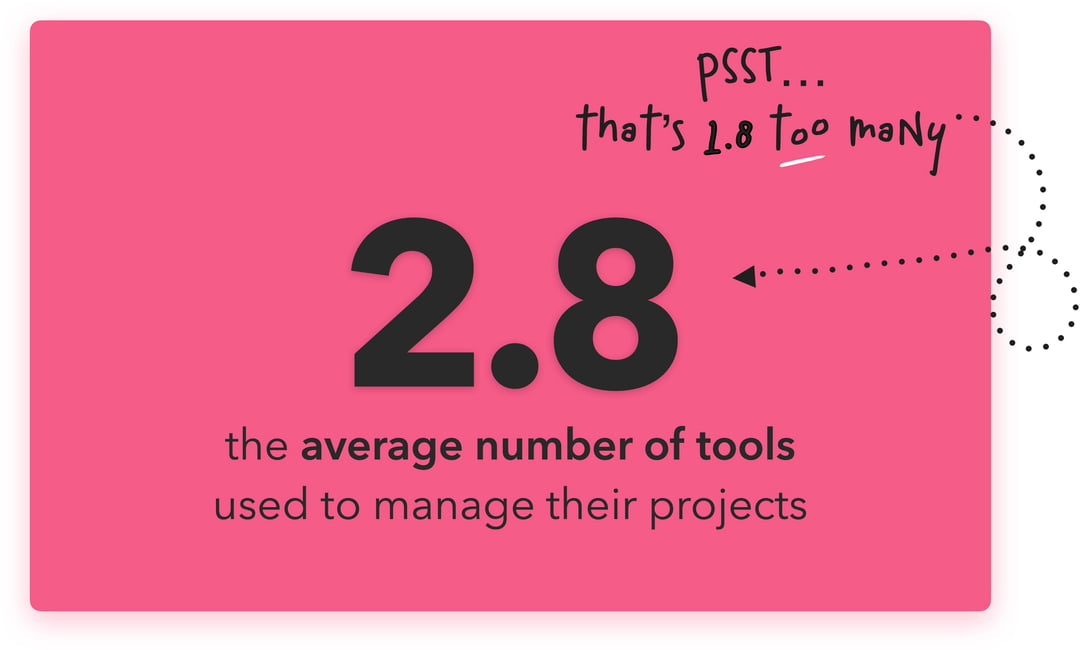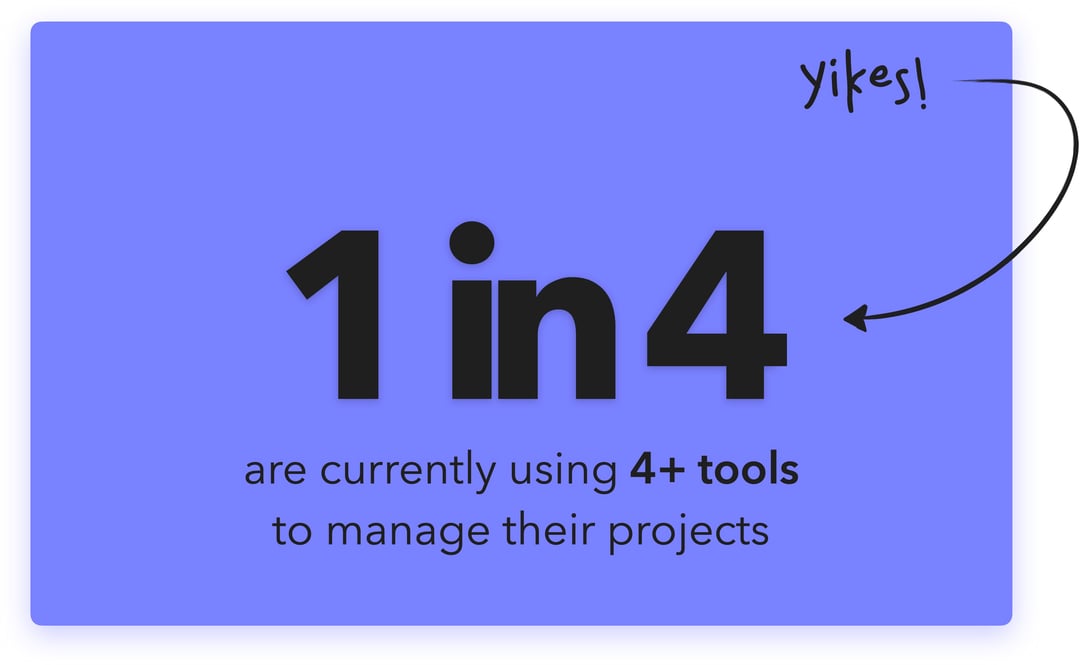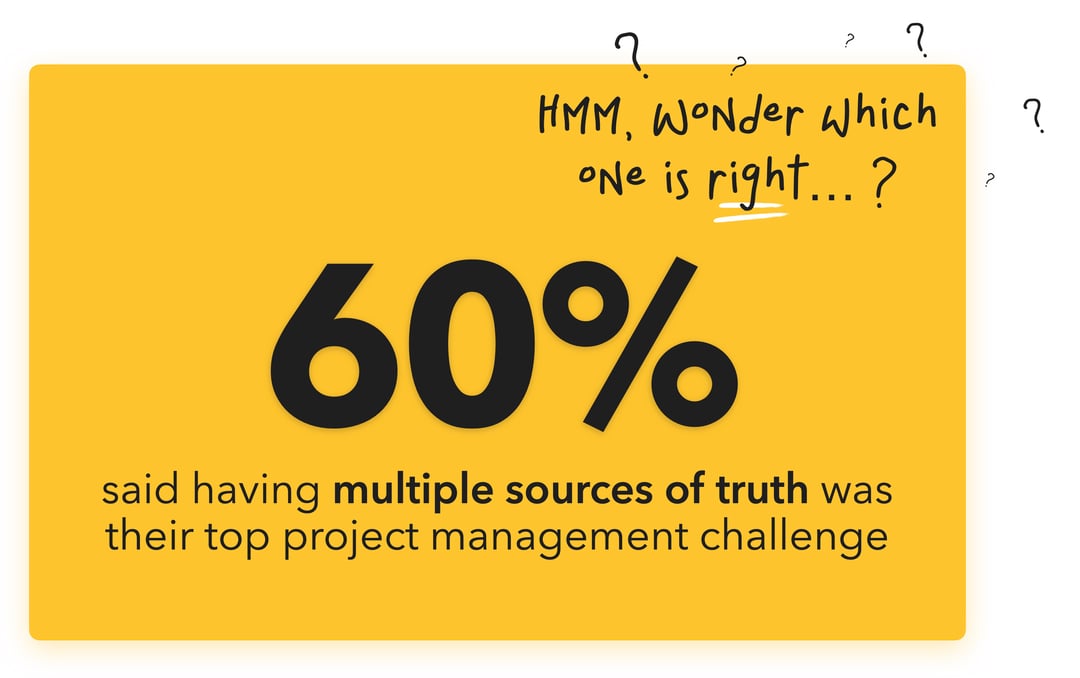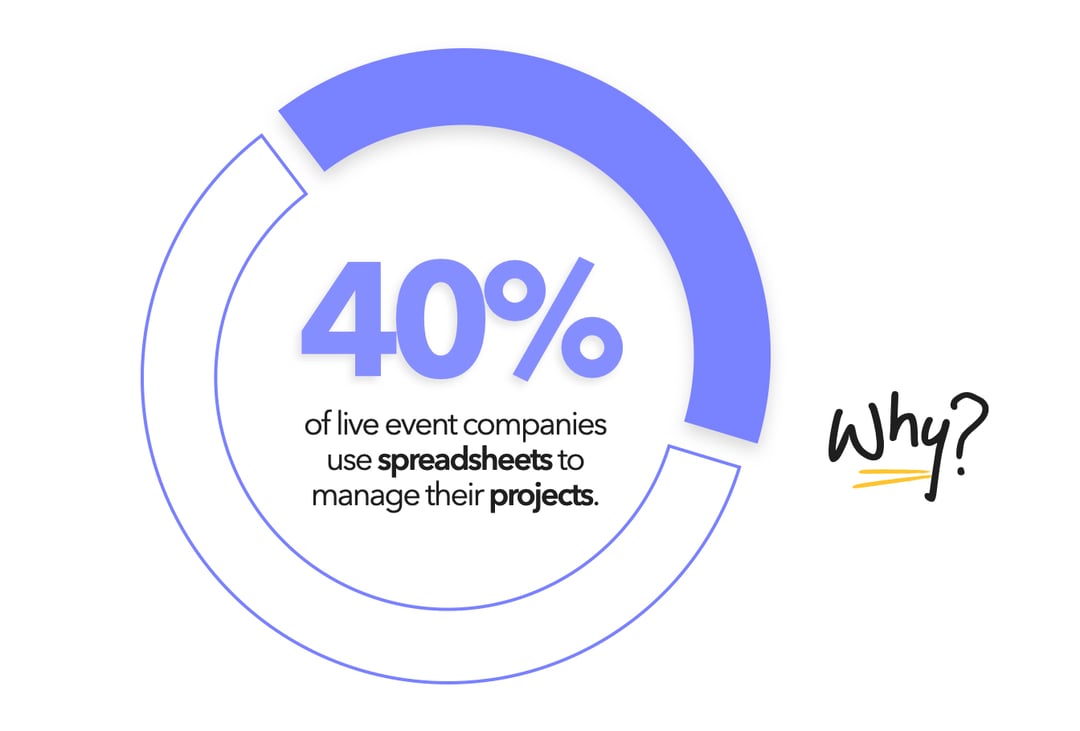Creating an unforgettable event is a Herculean task that requires a lot of time, effort, and coordination. From managing budgets to scheduling tasks, there are many different aspects to consider. Unfortunately, many event companies still rely on outdated methods and multiple tools to plan and produce their events, which can lead to confusion and errors.
In this post, we will take a look at the benefits of using a centralized platform to streamline the event planning and production process and provide a single source of truth. We will also share statistics that demonstrate the challenges event companies face when using multiple tools and systems — and how a centralized platform can help you to plan and produce more efficient and effective events.
In a recent survey, live event production pros like you told us about their current project management process.
Here's what we discovered. Click on each stat for more information.👇

Switching between multiple software and platforms can be time-consuming and inefficient.
Live events are a powerful way to bring people together and create unforgettable experiences. However, planning, producing, and crewing an event can be a complex and overwhelming task. One of the biggest challenges that event companies face is managing all of the different aspects of an event using multiple tools and systems.
According to a recent survey, event companies use an average of 2.8 tools to project manage their events. This can include a variety of different software and platforms, such as email, spreadsheets, calendar apps, and project management tools.
Unfortunately, having multiple tools and systems can make it difficult to keep track of all the different aspects of an event, leading to confusion and errors.

New research shows that a centralized approach to managing projects in live events — one that respects the way production teams plan — is more necessary than ever.
The use of multiple tools and systems can be particularly challenging for event companies. According to the same survey, 1 in 4 event companies are currently using 4 or more tools to project manage their events. This can make it difficult to ensure that everyone has access to the same information and that tasks and deadlines are being met.
Using multiple systems to manage a project can have potential disadvantages such as:
Complexity: Managing multiple systems can be more complex and time-consuming than using a single system. It may require more effort to ensure that all systems are properly integrated and synchronized, and to make sure that team members are using the correct tools and processes.
Confusion: Using multiple systems can create confusion, as different teams or individuals may not be aware of or have access to all of the systems being used. This can lead to miscommunication, inconsistencies, and duplicated effort.
Cost: Using multiple systems can also be more expensive, as you may need to pay for multiple licenses or subscriptions.
 Is averaging multiple truths sufficient or is a more reliable method needed?
Is averaging multiple truths sufficient or is a more reliable method needed?
One of the biggest challenges that event companies face when using multiple tools and systems is the lack of a single source of truth. With information scattered across different platforms and apps, it can be difficult to know what information is correct and up-to-date. In fact, 60% of event companies said having multiple sources of truth was their top project management challenge.
There is nothing like the headache of tracking down information and getting a variety of answers. This can happen when teams or individuals are using different systems to track and manage different aspects of a project, or when different systems are not properly integrated or synchronized. This can lead to confusion and inconsistencies, as different teams or individuals may have different views of the project's progress, tasks, and status.
Having one system for tracking project management changes helps to ensure a single source of truth, which is crucial for effective communication and decision-making within a team.

Spreadsheets are not designed or sustainable for managing live events.
Another challenge that event companies face is the use of spreadsheets to project manage their events. Despite the availability of specialized event planning software, many companies still rely on spreadsheets to keep track of tasks, deadlines, and budgets. According to the survey, 40% of event companies use spreadsheets to project manage their events.
Using spreadsheets to manage live projects can be problematic because they are not specifically designed for project management tasks. Spreadsheets are great for data analysis and organization, and while they may be able to store project information, they may not have the necessary features to effectively manage and track the progress of a project.
Spreadsheets can also be prone to errors, such as accidentally deleting or overwriting important data, and can become disorganized and difficult to navigate as a project progresses and changes.
Using spreadsheets for project management can make it difficult for team members to effectively collaborate and communicate with one another. This lack of clear communication can lead to confusion and delays in completing tasks, causing frustration for everyone involved.
Need a little help evaluating your PM tool? Check out these must-have features.


How can event companies make planning and production more efficient and effective?
The solution is to use a centralized platform for all aspects of event management.
A centralized platform combines all the features and functionality needed to plan, produce, and crew an event. This includes event planning, budgeting, scheduling, task management, communication, and more. By having all of these tools and features in one place, event companies can streamline their workflows and ensure that everyone has access to the same information. This helps to eliminate the confusion and errors that can arise when using multiple tools and systems.
A centralized platform also provides a single source of truth, making it easy to see what information is correct and up-to-date. This is particularly important when it comes to budgeting and scheduling, as it allows event companies to make informed decisions based on accurate data. This helps to ensure that events are completed on time and on budget, making it easier to meet the expectations of the attendees.
Having real-time data is one of the most important features of centralized platform, that allows an event producer to spot potential issues before they become a problem. It also gives you the ability to check on the progress of tasks and assignments as well as make adjustments where needed in real-time.
In addition to streamlining workflows and providing a single source of truth, a centralized platform also helps to improve communication and collaboration. By having all of the tools and features in one place, event companies can easily share information and collaborate on tasks and projects. This helps to ensure that everyone is on the same page and working towards the same goals.
Check out: Is your crewing workflow bleeding your budget dry?
LASSO’s approach to event project management
Imagine a project management tool designed specifically for the events industry. A tool that could manage both projects and event crew. LASSO's project management is an all-inclusive tool created for the live events and entertainment industry, which helps manage projects and personnel from beginning to end.
✔️ No more jumping from system to system: You can now manage both your event crew and your project tasks from one place.
✔️ You can stop scouring Slack, email, and spreadsheets: Tasks, documents, and real-time, two-way chats are all tied to their individual events.
✔️ Use templates to automatically generate milestones, tasks, and communication channels based on event type.
✔️ Reduce redundant work and the opportunity for mistakes.
✔️ Notes feature gives you a collaborative workspace for each event — it's the new production binder.
✔️ Document storage tied to each event for version control and organization.
✔️ Create a "client view" so you can control what your customers see (and don't!)
Related: How to Evaluate Project Management Tools for Live Events
Manage projects and crew effortlessly with a single source platform
A centralized platform is an essential tool for event companies. By combining all of the features and functionality needed to plan, produce, and crew an event, it helps to streamline workflows and ensure that everyone has access to the same information.
It also provides real-time data, which is critical for effective decision making and budgeting. And finally, it helps to improve communication and collaboration, making it easier to work together to ensure that events are completed on time and on budget.
Tired of juggling multiple tools? LASSO Project Management is here. Together, with our Crew Management solution, LASSO has become the live event production tool to replace them all.
